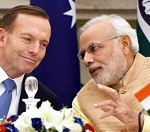On 18 November 2014, India and Australia established a framework for bilateral security cooperation, towards the advancement of regional peace. Sameer Patil, associate national security fellow at Gateway House, comments on the agreement and the need for such cooperation between the two countries.
Additionally, Gateway House had published a research paper on maritime security cooperation between India and Australia, authored by David Brewster, visiting fellow for maritime studies at Gateway House. The opportunities outlined in the research paper for maritime security cooperation between the two countries are prescient to those which are on the bilateral security cooperation framework that was released today. The research paper is available here.
Statement:
“Australia will emerge as India’s closest security partner in the Indian Ocean region if the security cooperation agreement between the two countries established in November 2014 is taken to its logical conclusion. As the major maritime powers in the region, India and Australia share similar security concerns such as China’s growing assertiveness, piracy, and human trafficking. While India is particularly concerned with the border dispute with China, both countries also share apprehensions about China’s unilateralism in the South China Sea and the Indian Ocean.
The agreement, with its emphasis on humanitarian assistance and disaster relief, highlights that both countries are now perceived as net security providers in the region. Regular bilateral maritime exercises, as mentioned in the framework agreement, are one of the means through which this cooperation will materialise. This will ensure that both countries play a major role in enhancing maritime domain awareness in the Indian Ocean region.
Additionally, these exercises will help achieve interoperability as both navies are acquiring similar platforms. A successful conduct of the bilateral exercises can also pave way in the future for Indian participation in the multilateral naval exercises hosted by Australia.
The agreement also outlines exploration of opportunities for defence research and development cooperation, which is aligned with the Modi government’s focus on promoting the involvement of Indian businesses in defence production through the ‘Make in India’ campaign. Defence research and development cooperation can become an important element of bilateral cooperation, provided India is able to do away with the challenges traditionally associated with its defence sector such as bureaucratic interruptions and protracted weapons acquisition process.
Counter-terrorism is another area highlighted in the framework agreement. This reflects the shared security concerns between the two countries about the growth of domestic radicalism, and dangers posed by it to their plural cultures. Pertinently both countries have seen recruitment to terrorist groups such as the Lashkar-e-Tayyaba and the Islamic State.
Another important area which will see increasing bilateral cooperation is cyber security, which builds on the concerns of both India and Australia regarding protection of critical infrastructure from cyber attacks. The coordination between CERTs, as envisioned in the agreement, will ensure greater information sharing on risks and vulnerabilities. As Australian and Indian businesses scramble to meet cyber threats, there is a significant scope for mutual learning and sharing best practices in this field.”
Related:
India’s vulnerable SCADA systems
India’s ocean: the story of India’s bid for regional leadership
For more information or interview requests, please contact Reetika Joshi at joshi.reetika@gatewayhouse.in.


